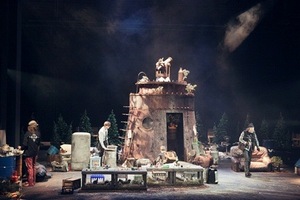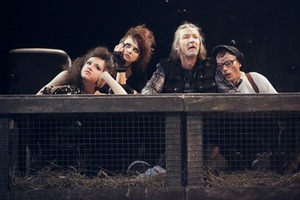SIDEWAYS ON THE ROAD TOWARDS THE PROMISED LAND 8
In brief: The director Rolandas Atkočiūnas mixed all kinds of realism and tried to add some magic in his eccentric tragicomedy “Jerusalem”. The cooperation with the set designer Martins Vilkarsis, the director’s conception, all 613 wishes and 7 desires turned into the salad in the performance. It seems sometimes that the viewer needs a voodoo and “miraculous” mushrooms to tune into the performance and to be lead to the general conception.
The viewer is met by naturalism on the stage. It is overloaded with various set design items and prop, it looks like there will never be any place for actors there. Not to speak about the live rabbit eating its hay in the corner of the cage.
Still, R. Atkočiūnas tries subtleties of magic realism too. Stories told by Johnny (actor Gintaras Adomaitis) try to erase the border between the truth and myth, to create allegorical tales and to present them to the listening youth as unquestionable. This is where the big fight with windmills starts. The director seems to be against the consumer lifestyle categorically and endeavours to create the spiritual oasis in theatre, like John in the performance, and to remind that people should have values – he reads a lecture about the outcomes of spiritual poverty.
However, can banal associations and comparisons lead to spiritual maturity? The wish appears to sink one’s eyes and never to lift them when the owner of the pub Šaras (actor Henrikas Savickis) steps on rabbit cages and starts dancing according to the pop song “Gangnam Style”.
Thus, despite the fact that aspirations were beautiful and big, the director did not really succeed to develop a solid story in the performance of almost three hours. The spiritual values appeared rather banal, they did not move hearts. There was no place for laughter. Apparently, the creators of the performance did not reach the promised land.


